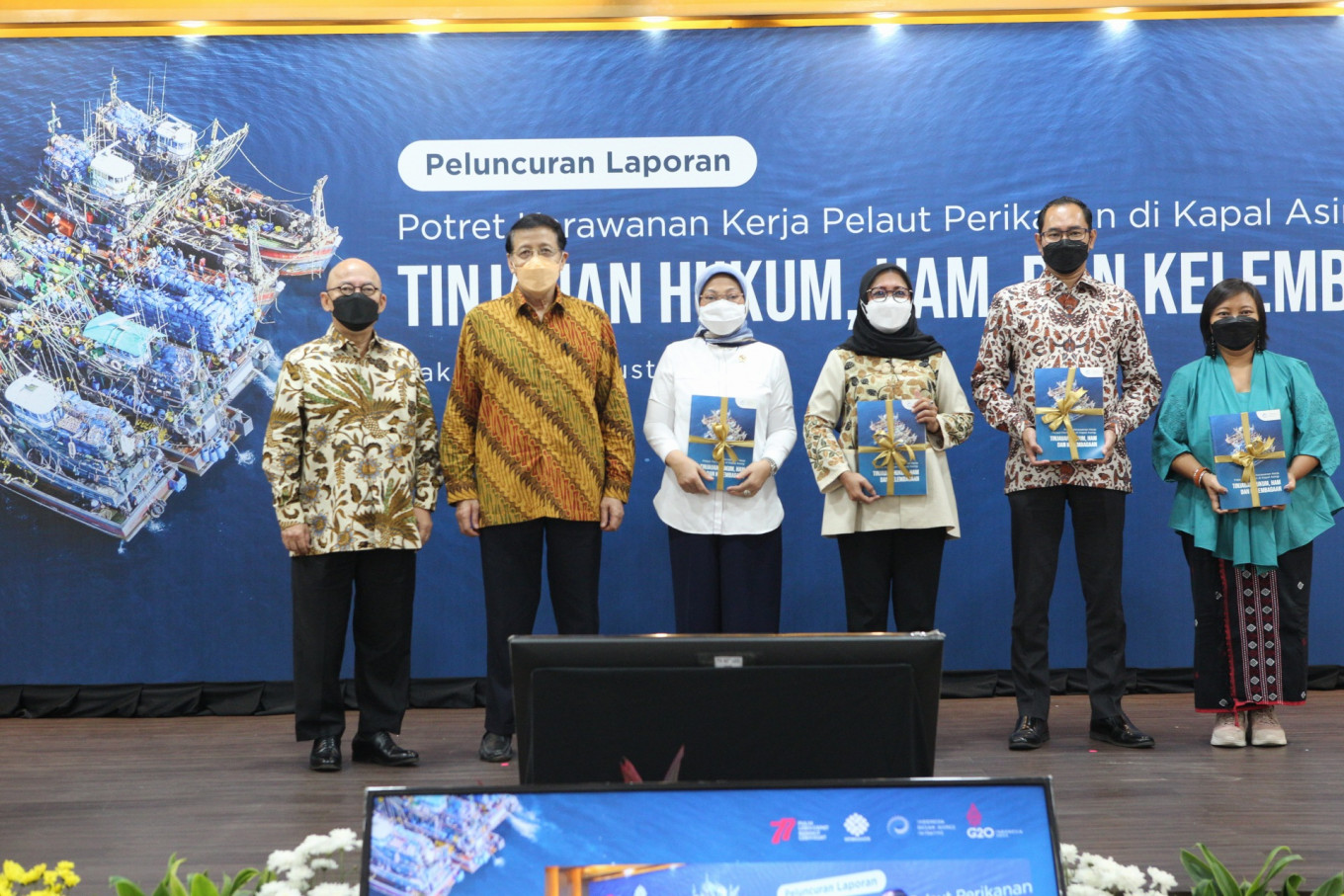Popular Reads
Top Results
Can't find what you're looking for?
View all search resultsPopular Reads
Top Results
Can't find what you're looking for?
View all search resultsIOJI Makes Several Recommendations to Strengthen Protection of Indonesian Migrant Fishers
The Indonesia Ocean Justice Initiative (IOJI) recently published a study entitled “Portrait of Work Vulnerability of Fishery Crews on Foreign Vessels: Legal, Human Rights and Institutional Reviews”.
Change text size
Gift Premium Articles
to Anyone
T
he Indonesia Ocean Justice Initiative (IOJI) recently published a study entitled “Portrait of Work Vulnerability of Fishery Crews on Foreign Vessels: Legal, Human Rights and Institutional Reviews”. The launch was attended by the Indonesian Minister of Manpower Dr. Hj. Ida Fauziyah and the Minister of Foreign Affairs 2001-2009 and IOJI Co-Founder Dr. Hassan Wirajuda.
The findings and recommendations of the report were discussed by member of the House of Representatives Commission IX overseeing demography, health, manpower and transmigration affairs, the director of the Protection of Indonesian Citizens at the Ministry of Foreign Affairs, the head of Migrant CARE's Center for Migration Studies and representatives from IOJI. Several key stakeholders were present to enrich the discussion on how to improve the legal framework, human rights protection, including the governance of the placement of Indonesian migrant-workers on foreign fishing vessels.
"The government is mandated by the Constitution to provide protection to all Indonesians, including those who work as fishery crews on foreign vessels," said Dr. Hassan. One of the obstacles faced by migrant workers include modern-slavery practices and human trafficking. The IOJI research team identifies five root causes that hinder the protection of Indonesian migrant fishers: the weakness of legal instruments at the international, regional, national and local levels; overlapping authorities and institutions; inequality of power relations between the sea-based migrant workers and employers; systemic violations in the recruitment and placement processes; and poor information systems, such as complaint handling mechanism and low accountability.
To improve the protection of the sea-based migrant workers, various policy recommendations and actions are presented by IOJI in this report, especially the ratification of ILO C-188 and CTA 2012, the establishment of labor standards for migrant fishers at the regional level, as well as the implementation of laws and regulations that guarantee protection for the sea-based migrant workers.
“The issuance of Government Regulation Number 22 of 2022 is one way to improve the governance of the sea-based migrant workers placements. The Ministry of Manpower will immediately follow up on all provisions in Government Regulation 22/2022 via the issuance of a ministerial regulation. The recommendations in the IOJI report will greatly support the process of issuing this regulation,” said Dr. Hj. Ida.
"The Ministry of Foreign Affairs is focusing on building a safe corridor for the sea-based migrant workers placement, for example via the Memorandum of Understanding [MoU] for the special placement of sea-based migrant workers, which is being explored with the governments of China and Taiwan,” said Judha Nugraha, director of Protection of Indonesian Citizens at the Ministry of Foreign Affairs.
Several recommendations have been made. First, to tackle the root cause, an MoU related to the placement of Indonesian migrant fishers in various countries is an essential step in developing the legal framework to protect them. Second, this must be accompanied by strengthening institutional functions and cross-agency coordination both at home and abroad to prevent the current problem of overlapping authorities and institutions.
A third recommendation is to strengthen the bargaining position of Indonesian migrant fishers via organizing, educating and standardizing work agreements. As pointed out by the CEO and Co-Founder of IOJI, Dr. Mas Achmad Santosa, most of the problems stem from the lack of information on job descriptions and migrant workers' rights, as well as the low level of education of migrant workers. This greatly contributes to inequality of power relations between Indonesian migrant fishers and employers.
To tackle systemic violations in the recruitment and placement processes, a new system needs to be put in place. Corrective measures include the availability of an integrated database of Indonesian migrant fishers to prevent non-procedural placements, law enforcement that provides a deterrent effect for non-procedural placement actors, international cooperation via Interpol, as well as intensive training for law enforcement regarding migrant fishers’ rights in restitution.
"So far, there has been impunity for corporations that exploit Indonesia migrant fishers. It’s a blatant modern’s day slavery and human trafficking," said Anis Hidayah, head of Migrant CARE's Center for Migration Studies.
Lastly, the fifth recommendation is strengthening transparency, access to information, and accountability on the protection of Indonesian migrant fishers through information digitalization, as supported by the Minister of Manpower. In order to do this, the government needs to develop digital-based solutions such as app for migrant workers that is real-time, reliable and integrated between agencies, along with providing an accessible digital platform for workers and their families throughout the migration process, including a clear mechanism for reporting any labour and human rights violations. The process needs to be reviewed by the government, civil-society groups, and private sector, especially in the transparent imposition of more affordable remittance fees. Compared to bank and non-bank fund transfer services, mobile money and digital wallets reduced more transaction costs. These are among ready and reliable solutions, which can support the implementation of a safe, fair, regular migration of fishery workers from Indonesia to the destination countries.










